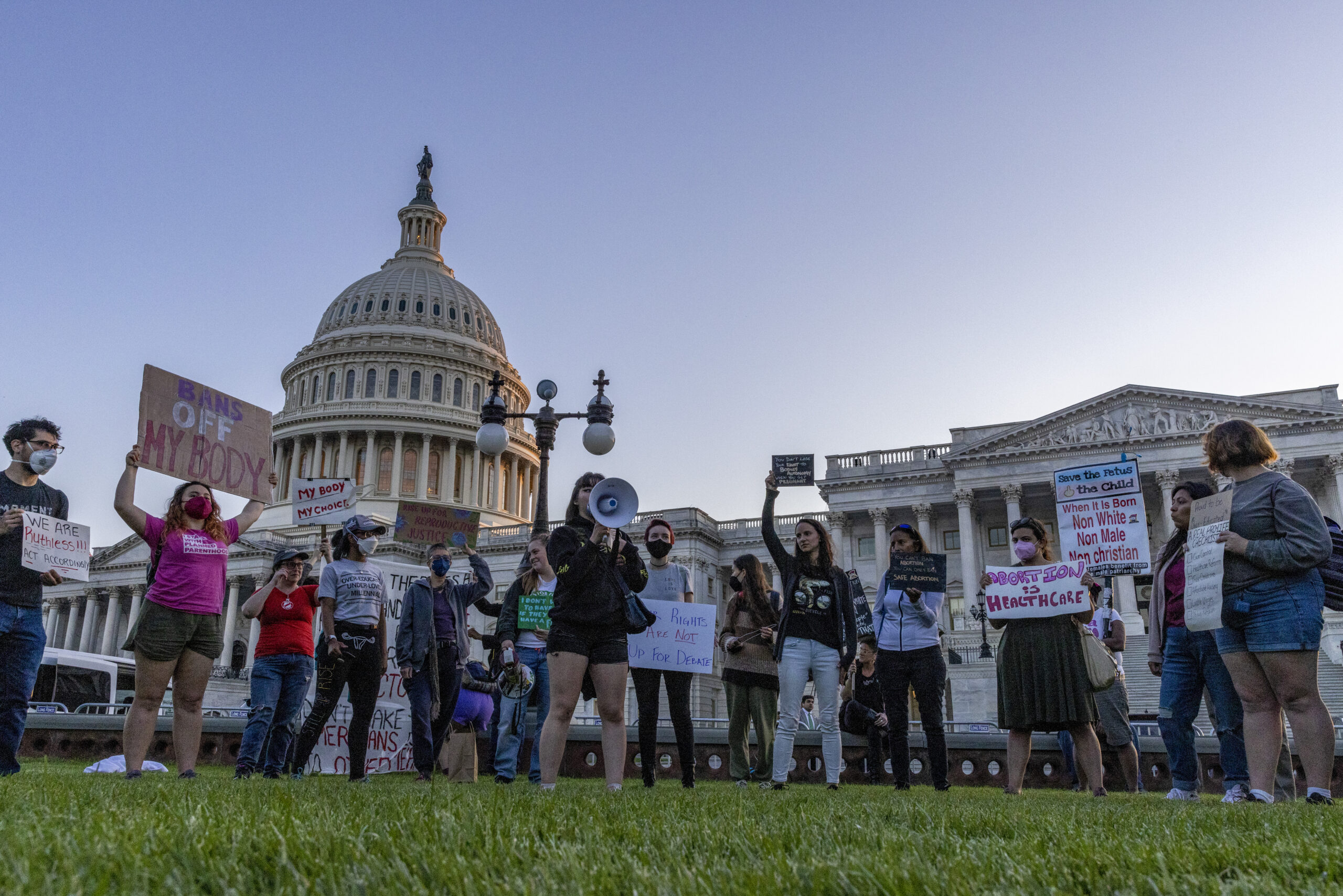
Abortion-rights demonstrators protest in front of the U.S. Supreme Court building on May 10, 2022 in Washington, DC. Senate Democrats plan take up a bill May 11 that would codify abortion rights in federal law, but it is all but certain to come up short of the 60 votes needed to overcome a Republican fillibuster. (Photo by Tasos Katopodis / Getty Images)
My colleague Will Leitch has a thoughtful article in New York magazine called “Why Athletes Are Ignoring Roe v. Wade,” which looks at the absence of athlete activism or commentary following the leak that showed Supreme Court’s theocratic flank’s efforts to overturn the landmark abortion rights decision. Leitch notes the relative silence from the sports world and wonders if the political intervention by athletes that we saw explode in 2020 after the police murder of George Floyd has slowed. He ponders a number of reasons for this, from the centrality of Black athletes who organically gravitated toward anti-racist, anti-police brutality work to the fact that many athletes are conservative and anti-choice, to being warded off an issue deemed too controversial to touch. He also correctly critiques one male political athlete for basically saying, “The WNBA should handle it,” as if it’s not a responsibility for all of us to stand up to this Supreme Court. (For what it’s worth, the WNBA has in fact released a statement.)
Leitch is asking a critical question, and all of his theories have dollops of truth, but they contain an oversight in analysis that a lot of us fall prey to. No one, as the saying goes, is coming to save us but us. Our starting point, therefore, should not be, “Why isn’t there more athlete activism around abortion rights?” It should be, “Why isn’t there more activism from all of us around abortion rights? And why would we ask of athletes what we don’t ask of ourselves?” After all, 70 percent of the country wants Roe to be the law of the land, and yet the response when the Supreme Court said it would take this up months ago was little to no uptick in grassroots action.
Since the leak, we have seen people all across the country attempt to raise hell and be heard. We have seen people gather outside the Supreme Court and protest outside the homes of these desiccated vultures in robes. Yet when we are looking for the kind of groups with infrastructure and money, like those that organized the 2004 March for Women’s Lives or the 2020 Women’s March, to hold mass demonstrations, they have done little over the last year but take marching orders from the Democratic Party to silently lobby or get out the vote. Representative Sean Maloney articulated the Democratic approach when he tweeted after the leak, “Democrats: We’re angry and hurt, I know. But it’s not about filibuster, size of the court or what the Senate hasn’t passed. It’s about Republicans, not us. We can save our freedoms. But, it’s November, stupid.”
What a luxury to wait until November. How many will suffer on the altar of such an uninspiring message? In the face of this message from the party that is supposed to be defending abortion rights, I understand why people are looking to athletes to lead. But why would we ask of them what we don’t ask of ourselves? Thinking the athletes shall lead us is a failure to understand the history of athlete activism. It is always the movement who speaks out first, followed by the athletes. The best example of this is Muhammad Ali, who didn’t come down from Planet Awesome to educate us about racism and the war in Vietnam. The heavyweight champion, first known as Cassius Clay, who brought the showmanship of pro wrestling into boxing hadn’t aspired to be like Malcolm X. His hero was pro wrestler Gorgeous George Wagner. But then the 1960s, in all its tumult, intervened and shaped his own life, and the world was never the same. Or Colin Kaepernick, who took a knee four years after the start of the Black Lives Matter movement. Or look at 2020. That summer contained the largest demonstrations in the history of the United States. Athletes helped amplify the message—but they didn’t launch it. That was done by thousands of people whose names we do not know but who made an impact in small ways that together shaped our history.
This weekend, there will be marches all over the country. MoveOn, Planned Parenthood, the Women’s March, UltraViolet, and reproductive justice leaders are hosting the Bans Off Our Bodies National Day of Action this Saturday, May 14. Let’s see how large these marches are, how many athletes come out, and whether that shapes a new response from athletes. But without this kind of broader activism, waiting for the sports world to save us is going to be one hell of a wait.
Dave ZirinDave Zirin is the sports editor at The Nation. He is the author of 11 books on the politics of sports. He is also the coproducer and writer of the new documentary Behind the Shield: The Power and Politics of the NFL.